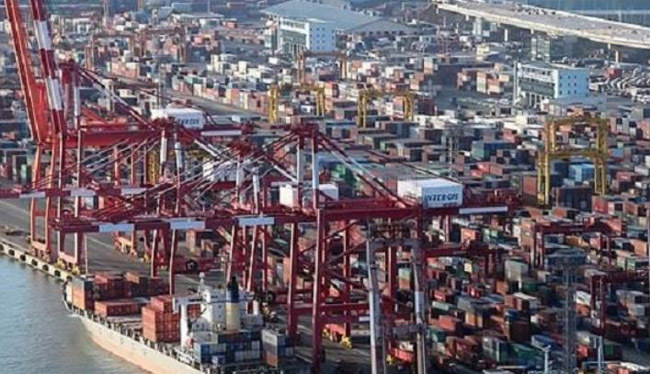South Korea’s economy faces multiple challenges after Chuseok
By Bae Hyun-jungPublished : Oct. 2, 2017 - 13:46
South Korea’s hope upon this year’s 10-day Chuseok holiday was that the long break would boost consumption and revive the domestic market momentum, but external risks mean that the nation’s economic prospects for the last quarter of the year remain murky.
The foreseeable challenges include the ongoing dissent between Korea and the US over their bilateral trade deal, the imminent expiration of the Korea-China currency swap agreement, and impact on the markets from escalating military tension between US and North Korea.
“It seems that the North Korean risk has increased from a month earlier,” Bank of Korea Gov. Lee Ju-yeol told reporters on Friday. “Should such risk continue to mount, there is a possibility that it may deliver a negative impact on the real economy.”
Details of the central bank’s economic stance and revised economic outlook will be decided on Oct. 19, when the BOK is slated to hold its quarterly monetary policy meeting.
The monetary chief official has also mentioned the chance of hiking the nation’s all-time low key interest rate, regardless of inflation, but only if the economy is on a mid-term recovery trend.
Given the current geopolitical and economic situations, along with remarks coming from key policymakers, it is unlikely that the BOK may change up the figure to near the 3 percent mark.
Back in April, the bank had upped the observation value from 2.5 percent to 2.6 percent, and once again to 2.8 percent in July, making it a rare case of consecutive raises.
The foreseeable challenges include the ongoing dissent between Korea and the US over their bilateral trade deal, the imminent expiration of the Korea-China currency swap agreement, and impact on the markets from escalating military tension between US and North Korea.
“It seems that the North Korean risk has increased from a month earlier,” Bank of Korea Gov. Lee Ju-yeol told reporters on Friday. “Should such risk continue to mount, there is a possibility that it may deliver a negative impact on the real economy.”
Details of the central bank’s economic stance and revised economic outlook will be decided on Oct. 19, when the BOK is slated to hold its quarterly monetary policy meeting.
The monetary chief official has also mentioned the chance of hiking the nation’s all-time low key interest rate, regardless of inflation, but only if the economy is on a mid-term recovery trend.
Given the current geopolitical and economic situations, along with remarks coming from key policymakers, it is unlikely that the BOK may change up the figure to near the 3 percent mark.
Back in April, the bank had upped the observation value from 2.5 percent to 2.6 percent, and once again to 2.8 percent in July, making it a rare case of consecutive raises.

“Because of the 10-day holiday in early October, it is inevitable that (economic) indexes should take a downturn to a certain extent afterwards,” Deputy Prime Minister for economic affairs and Finance Minister Kim Dong-yeon told reporters on Friday.
According to a survey conducted by the Korea Chamber of Commerce and Industry on 2,200 manufacturing companies here, the Business Survey Index for the fourth quarter stood at 85, down 9 points from the past quarter.
Exports in September peaked at a record-high $55.1 billion -- the highest-ever since the Trade Ministry started collecting data in 1956 -- thanks to double-digit growth in steel and semiconductors, but skeptics attributed it to mass early shipments ahead of the long holiday.
Of the other roadblocks lying ahead is the Korea-US Free Trade Agreement Joint Committee meeting, due to take place in Washington DC on Wednesday, local time.
While their last gathering in Seoul fell through, the two sides will once again lock horns on whether or not to renegotiate the bilateral trade deal, which US President Donald Trump accused of being unfavorable for American workers.
The renegotiation, should it take place, is likely to heavily affect South Korea’s automobile, ICT, home electronic appliance, steel, machinery and textile industries, according to the Korea Economic Research Institute.
Another key threat is the likeliness of further provocations from Pyongyang which is due to celebrate its party’s foundation day on Oct. 10.
“We expect additional provocations by North Korea on Oct. 10 or 18,” according to Chung Eui-yong, national security chief of the presidential office Cheong Wa Dae, hinting at a possible missile launch.
In addition, a 360 billion-yuan currency swap between Korea and China is to expire on Oct. 10, while no consensus has yet been reached on extending the deal, partly due to the increased tension following Seoul’s deployment of the US anti-missile system here.
“We will continue the negotiations during the holiday,” BOK chief Lee said, dismissing the financial market’s growing concerns over the currency deal.
By Bae Hyun-jung (tellme@heraldcorp.com)


















![[Today’s K-pop] BTS pop-up event to come to Seoul](http://res.heraldm.com/phpwas/restmb_idxmake.php?idx=642&simg=/content/image/2024/04/17/20240417050734_0.jpg&u=)